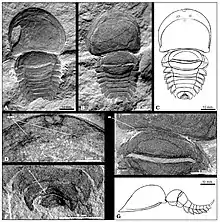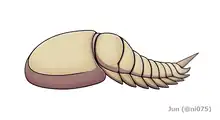| Pasternakevia Temporal range: | |
|---|---|
 | |
| Fossils and illustrations of P. podolica | |
| Scientific classification | |
| Domain: | Eukaryota |
| Kingdom: | Animalia |
| Phylum: | Arthropoda |
| Subphylum: | Chelicerata |
| Clade: | Prosomapoda |
| Clade: | Planaterga |
| Genus: | †Pasternakevia Selden & Drygant, 1987 |
| Type species | |
| †Pasternakevia podolica Selden & Drygant, 1987 | |

Pasternakevia is a genus of synziphosurine,[1] a paraphyletic group of fossil chelicerate arthropods.[2][3] Pasternakevia was regarded as part of the clade Planaterga.[2][4][5][6][3][7] Fossils of the single and type species, P. podolica, have been discovered in deposits of the Silurian period in Podolia, Ukraine.[7][2]
The prosoma of Pasternakevia covered by a smooth, semicircular carapace with rounded genal cornua (posterolateral corner of carapace).[1] Within the 10-segmented opisthosoma, tergite of the first segment is reduced and usually hidden under the preceding carapace, while the second one is significantly arched and well-developed.[1] All but the first tergite possess well-developed pleurae (lateral extension). A complete telson is yet to be discovered.[1]
References
- 1 2 3 4 Krzemiński, Wiesław; Krzemińska, Ewa; Wojciechowski, Dariusz (2010). "Silurian Synziphosurine Horseshoe Crab Pasternakevia Revisited". Acta Palaeontologica Polonica. 55 (1): 133–139. doi:10.4202/app.2008.0074. ISSN 0567-7920.
- 1 2 3 Lamsdell, James C. (2013). "Revised systematics of Palaeozoic 'horseshoe crabs' and the myth of monophyletic Xiphosura". Zoological Journal of the Linnean Society. 167 (1): 1–27. doi:10.1111/j.1096-3642.2012.00874.x. ISSN 0024-4082.
- 1 2 Bicknell, Russell D. C.; Pates, Stephen (2020). "Pictorial Atlas of Fossil and Extant Horseshoe Crabs, With Focus on Xiphosurida". Frontiers in Earth Science. 8: 98. Bibcode:2020FrEaS...8...98B. doi:10.3389/feart.2020.00098. ISSN 2296-6463.
- ↑ Selden, Paul A.; Lamsdell, James C.; Qi, Liu (2015). "An unusual euchelicerate linking horseshoe crabs and eurypterids, from the Lower Devonian (Lochkovian) of Yunnan, China". Zoologica Scripta. 44 (6): 645–652. doi:10.1111/zsc.12124. ISSN 0300-3256. S2CID 55264483.
- ↑ Lamsdell, James C.; Briggs, Derek E. G.; Liu, Huaibao P.; Witzke, Brian J.; McKay, Robert M. (2015). "A new Ordovician arthropod from the Winneshiek Lagerstätte of Iowa (USA) reveals the ground plan of eurypterids and chasmataspidids". The Science of Nature. 102 (9–10): 63. Bibcode:2015SciNa.102...63L. doi:10.1007/s00114-015-1312-5. ISSN 0028-1042. PMID 26391849. S2CID 8153035.
- ↑ Bicknell, Russell D. C.; Lustri, Lorenzo; Brougham, Tom (2019-12-01). "Revision of "Bellinurus" carteri (Chelicerata: Xiphosura) from the Late Devonian of Pennsylvania, USA". Comptes Rendus Palevol. 18 (8): 967–976. doi:10.1016/j.crpv.2019.08.002. ISSN 1631-0683.
- 1 2 Dunlop, J. A.; Penney, D.; Jekel, D. (2020). "A summary list of fossil spiders and their relatives" (PDF). World Spider Catalog. Natural History Museum Bern. pp. 1–296.